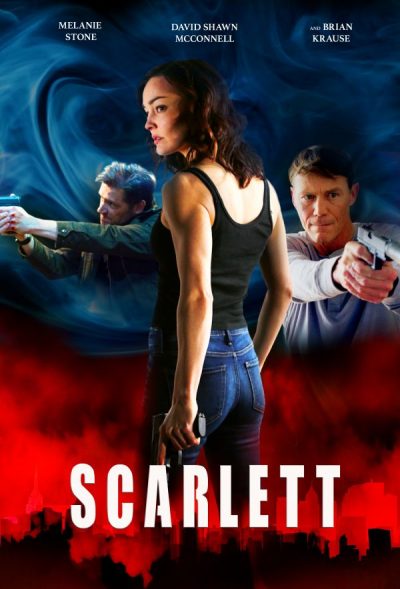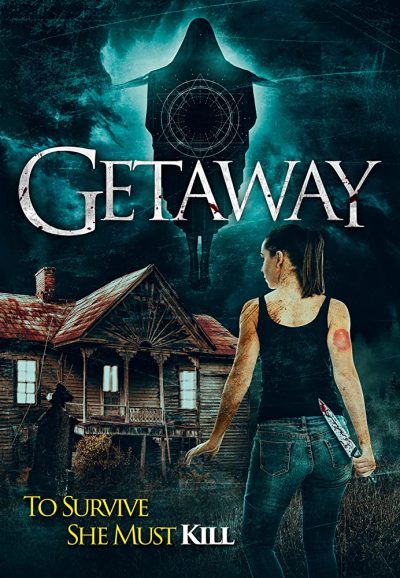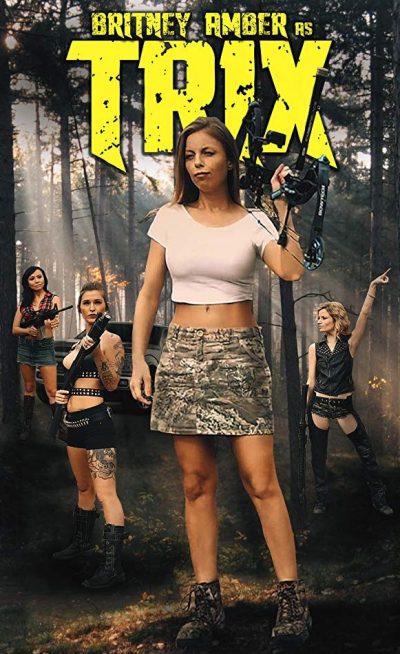★★½
“Better red than dead.”
 I was looking forward to this one quite a bit. Lyde is no stranger to these pages, having a track record of low-budget action heroines to his name: Survivor, 626 Evolution and a couple of entries in the Mythica franchise, including the best of them, Mythica: The Iron Crown. The star here, Melanie Stone, was also a big part of Mythica, where she played Marek the necromancer, so I was excited to see what their reunion might bring. And… s’okay, I suppose. In particular, you will need to be in a very forgiving mood as far as the plot goes. The heroine is Scarlett (Stone), a nursing student at odds with her father, Cal (Krause), a single parent who keeps her on a tight leash and has trained Scarlett in all manner of unusual skills, from martial arts to pursuit evasion. For we know, and Scarlett doesn’t, that her father is a globetrotting spy, who is concerned his pigeons might come home to roost one day.
I was looking forward to this one quite a bit. Lyde is no stranger to these pages, having a track record of low-budget action heroines to his name: Survivor, 626 Evolution and a couple of entries in the Mythica franchise, including the best of them, Mythica: The Iron Crown. The star here, Melanie Stone, was also a big part of Mythica, where she played Marek the necromancer, so I was excited to see what their reunion might bring. And… s’okay, I suppose. In particular, you will need to be in a very forgiving mood as far as the plot goes. The heroine is Scarlett (Stone), a nursing student at odds with her father, Cal (Krause), a single parent who keeps her on a tight leash and has trained Scarlett in all manner of unusual skills, from martial arts to pursuit evasion. For we know, and Scarlett doesn’t, that her father is a globetrotting spy, who is concerned his pigeons might come home to roost one day.
Turns out, he’s right to worry, and he is kidnapped by people who want a bioweapon he is holding, so they can sell it to the highest bidder. Scarlett has to turn her skills to practical use, locate the people who abducted her father and release him. Except, her first attempt instead frees Sean (McConnell), an associate of her father who had also been kidnapped by the bad guys. Somewhat reluctantly, he teams up with Scarlett as her investigation brings her ever closer to a face-off where she’ll exchange her father for the vial of bio-nastiness. One of the numerous problems with the story is, the twist in the second half is blatantly obvious. I’m usually easy to fool, but spotted it quickly. Even worse, Chris wandered in about half-way and within five minutes, had also nailed it. That Scarlett was apparently oblivious, doesn’t quite jibe with her supposedly razor-sharp abilities, that let her easily out-think and out-fight the professionals the rest of the time.
Stone is not bad, clearly doing a lot of her own action, to decent effect; even simple things like a foot-chase, which sees her leaping fences in a way which would have many actresses calling for a stunt double. However, it feels as if she takes a back seat to her father as things proceed. While Krause is actually surprisingly good, he’s no Scott Adkins – and to be honest, we’re not here for him, but the action promised by the sleeve, which puts Scarlett front and centre. I think this might have worked better had they been a fully-functional and active father-daughter partnership before his abduction (the end vaguely hints at that as a possible future direction). As is, the repeated flashbacks needed to cover her training makes for a bit of an awkward structure, not adding much to proceedings. The film is a good idea, and the low-budget is well enough disguised not to be a problem. The script, however, is well below par, and ends up taking the whole endeavour down with it.
Dir: John Lyde
Star: Melanie Stone, Brian Krause, David McConnell






 Is it possible for a film to try and cram in too much? This might be guilty of that, being simply too full of ideas. It begins with a serial killer mother and son pair, who are also cannibals, to boot. They think they’ve found their next victims, when they pick up a pair of young hitchhikers, Ursula (Steadman) and Rose (Brown). However, the psychos are in for a shock, because their targets are actually a pair of vampires, centuries old. But, wait! There’s more! Weird meteorites have landed on Earth containing alien creatures, that devour human souls. Those they infect turn into aggressive, zombie-like creatures, that can only be terminated by destroying their pineal glands. And I haven’t even touched on Father Cooper (Travis), and his “nun with a gun” associate, Sister Gigi (Smith, right).
Is it possible for a film to try and cram in too much? This might be guilty of that, being simply too full of ideas. It begins with a serial killer mother and son pair, who are also cannibals, to boot. They think they’ve found their next victims, when they pick up a pair of young hitchhikers, Ursula (Steadman) and Rose (Brown). However, the psychos are in for a shock, because their targets are actually a pair of vampires, centuries old. But, wait! There’s more! Weird meteorites have landed on Earth containing alien creatures, that devour human souls. Those they infect turn into aggressive, zombie-like creatures, that can only be terminated by destroying their pineal glands. And I haven’t even touched on Father Cooper (Travis), and his “nun with a gun” associate, Sister Gigi (Smith, right). Despite a very brief running time of only 70 minutes, this still manages to seem talky and overlong. That’s a shame, as it manages to waste a good performance from a genre veteran, playing an action heroine who is not your typical one. The former is Camille Keaton, who is having a bit of a B-movie renaissance in her career, forty years after starring in the notorious rape-revenge film, I Spit on Your Grave. And the latter? Well, Keaton is now in her seventies, but based on this, is still capable of wielding a mean shotgun. And clearly, of taking no shit from anyone. Indeed, you could almost read this as the sundown years of her Grave character, Jennifer Hills.
Despite a very brief running time of only 70 minutes, this still manages to seem talky and overlong. That’s a shame, as it manages to waste a good performance from a genre veteran, playing an action heroine who is not your typical one. The former is Camille Keaton, who is having a bit of a B-movie renaissance in her career, forty years after starring in the notorious rape-revenge film, I Spit on Your Grave. And the latter? Well, Keaton is now in her seventies, but based on this, is still capable of wielding a mean shotgun. And clearly, of taking no shit from anyone. Indeed, you could almost read this as the sundown years of her Grave character, Jennifer Hills.
 There are times when I am bracing myself, going into a movie. Here’s the synopsis for this one: “A transgender teenage girl on summer vacation in Los Angeles fights to survive after she falls in with four queer feminist vampires, who try to rid the city’s streets of predatory men.” Given my long-standing aversion to message movies, this seemed like 90 minutes of my worst nightmare. What had I let myself in for? But this proved to be surprisingly accessible – even for those of us who are neither transgender nor queer, and are enrolled in the Camille Paglia school of feminism.
There are times when I am bracing myself, going into a movie. Here’s the synopsis for this one: “A transgender teenage girl on summer vacation in Los Angeles fights to survive after she falls in with four queer feminist vampires, who try to rid the city’s streets of predatory men.” Given my long-standing aversion to message movies, this seemed like 90 minutes of my worst nightmare. What had I let myself in for? But this proved to be surprisingly accessible – even for those of us who are neither transgender nor queer, and are enrolled in the Camille Paglia school of feminism. This was likely not going to qualify for inclusion here, until a twist in the final 15 minutes. Up until that point, it had been a largely irritating saga, that was considerably more horror than action heroine – and not even good horror at that. I’m still significantly unconvinced about the quality, but must grudgingly admit, this was a twist which I did not particularly see coming (though there is a large clue dropped near the beginning). Three gal-pals, Tamara (Betham), Maddy (Taylor-Compton) and Brooke (Allbright) head for a weekend’s lakeside R&R. On the way, Tamara’s car runs out of fuel, and she encounters the local creeps, but eventually arrives, and joins the other two in scamming drinks out of horny guys.
This was likely not going to qualify for inclusion here, until a twist in the final 15 minutes. Up until that point, it had been a largely irritating saga, that was considerably more horror than action heroine – and not even good horror at that. I’m still significantly unconvinced about the quality, but must grudgingly admit, this was a twist which I did not particularly see coming (though there is a large clue dropped near the beginning). Three gal-pals, Tamara (Betham), Maddy (Taylor-Compton) and Brooke (Allbright) head for a weekend’s lakeside R&R. On the way, Tamara’s car runs out of fuel, and she encounters the local creeps, but eventually arrives, and joins the other two in scamming drinks out of horny guys. It’s weird what you stumble across on Amazon Prime. This is the feature-length version of a web series, originally made in 10 episodes. Just based on the title and description – “Delinquent girls are trained to perform risque but dangerous kung fu fight shows in a Las Vegas now owned and operated by the Chinese Mafia.” – I thought it best to wait until Chris was not around. Mostly because I’m not sure I could have stood the dripping sarcasm. Turns out, I needn’t have worried. Everyone remains attached to their clothes, and it’s resolutely PG-13 rated. Indeed, we actually see very little of the “risque” shows mentioned, which is a bit of a shame: the fragments we see, along with the training clips, suggest it’s something I’d love to attend in Vegas.
It’s weird what you stumble across on Amazon Prime. This is the feature-length version of a web series, originally made in 10 episodes. Just based on the title and description – “Delinquent girls are trained to perform risque but dangerous kung fu fight shows in a Las Vegas now owned and operated by the Chinese Mafia.” – I thought it best to wait until Chris was not around. Mostly because I’m not sure I could have stood the dripping sarcasm. Turns out, I needn’t have worried. Everyone remains attached to their clothes, and it’s resolutely PG-13 rated. Indeed, we actually see very little of the “risque” shows mentioned, which is a bit of a shame: the fragments we see, along with the training clips, suggest it’s something I’d love to attend in Vegas. Bonnie Blackwell (Lesseos) is a battered wife, whose husband, Zach (Bottoms), eventually goes too far, putting her in hospital. He gets a spell in prison, and she decides to take control of her life and become a police officer. However, the scars of her abuse run deep, and she finds herself initially “freezing” when faced with potential threats, due to the PTSD resulting from her abusive relationship. Encouraged by colleague Bill Starr (Douglas), she eventually manages to work her way past that, just in time for Zach to be released from jail without her knowledge. She discovers that he had been running a human trafficking operation, bringing in Vietnamese mail-order brides, and sets out to take him down.
Bonnie Blackwell (Lesseos) is a battered wife, whose husband, Zach (Bottoms), eventually goes too far, putting her in hospital. He gets a spell in prison, and she decides to take control of her life and become a police officer. However, the scars of her abuse run deep, and she finds herself initially “freezing” when faced with potential threats, due to the PTSD resulting from her abusive relationship. Encouraged by colleague Bill Starr (Douglas), she eventually manages to work her way past that, just in time for Zach to be released from jail without her knowledge. She discovers that he had been running a human trafficking operation, bringing in Vietnamese mail-order brides, and sets out to take him down. Maybe I’m getting too old for this kind of thing. Perhaps there was a time in my callow youth when I would have been grateful for the light-to-moderate amount of gratuitous nudity which this contains. Now, though? Its flaws overwhelm any such merits. Or maybe it was the fact that I watched this while dozed up to the eyeballs on DayQuil, and frankly, coughing up phlegm proved to be a more satisfactory pursuit.
Maybe I’m getting too old for this kind of thing. Perhaps there was a time in my callow youth when I would have been grateful for the light-to-moderate amount of gratuitous nudity which this contains. Now, though? Its flaws overwhelm any such merits. Or maybe it was the fact that I watched this while dozed up to the eyeballs on DayQuil, and frankly, coughing up phlegm proved to be a more satisfactory pursuit.